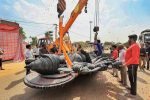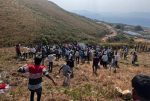
Stung by prison battle, Kurds say they need help against IS
PTI, Feb 5, 2022, 3:42 PM IST

Image Credit: Baderkhan Ahmad / Associated Press
Hassakeh: Weeks after the long, furious battle with militants from the Islamic State group over a prison in northeastern Syria, the mangled wreckage of a car used by suicide bombers still sat outside its perimeter. Cranes put in place new cement blast walls to close off the entrance.
Gaping holes remained in the prison’s outer wall, an ominous reminder of the IS inmates who escaped during the fighting.
The battle for Gweiran Prison is over; it took 10 days, but U.S.-backed, Syrian Kurdish-led forces finally defeated the militants who attacked the facility in the city of Hassakeh, aiming to break free their comrades jailed inside, in the group’s largest and most stunning operation in years.
But the impact continues to reverberate. Residents in neighboring districts are locked down as Kurdish fighters hunt for fugitive militants hiding among them.
“Ask everyone here, they will tell you the same: We are terrified,” said Muna Farid, a mother of five who lives in the Gweiran neighborhood, which gives the prison its name — echoing the worries of dozens of residents over hidden IS fighters.
The region’s Kurdish administrators say the attack shows what they have long been saying: They are not getting enough help to face the Islamic State group as it regains strength.
The Kurdish-led Syrian Democratic Forces say the January 20 prison attack was not a surprise to them. Local intelligence sources had been showing a growing number of IS sleeper cells in the area. But they say they were hampered in acting because of multiple pressures, including conflicts with Turkey, insufficient international help and Syria’s economic crisis.
“The main reason that IS sleeper cells got enhanced and strong is because of international silence and weak support (for SDF) to stand against terrorism,” said Haval Qortay, head of the commando unit that fought IS at the prison, using his nom de guerre.
“We are relying on resources that are not enough to fight.” IS suffered a blow with the U.S. raid Thursday in northwest Syria that killed the group’s leader, Abu Ibrahim al-Hashimi al-Qurayshi. But it is unlikely to derail the group’s persistent insurgency in Iraq and Syria since its command became much more decentralized after the group’s territorial defeat two years ago.
“For some time now ISIS top leadership have been providing broad, strategic guidance to the global organization, but not day-to-day command and control,” said Dareen Khalifa, a senior analyst at the International Crisis Group. “ISIS’s various elements will continue implementing their local insurgencies until the new successor is named.” Since IS lost its last hold on any territory in 2019, its militants have gone underground in cells that have been carrying out low-level hit-and-run attacks in Syria and Iraq, mainly targeting security forces. Those attacks have been growing, raising fears the group is gaining momentum.
In northeast Syria, governed by a Kurdish-dominated administration, the SDF has been the main force trying to suppress IS, with the backing of several hundred U.S. troops.
At the same time, the SDF has to watch over some 10,000 captured IS fighters in around two dozen detention facilities — including 2,000 foreigners whose home countries have refused to repatriate them. It also oversees some 62,000 family members of IS fighters, mostly women and children in the al-Hol camp. Many of those family members remain die-hard IS supporters, and the camp has seen bouts of militant violence.
Khalifa said the SDF has done a “remarkable job” in fighting IS and in stabilizing the areas it captured from the group during the long campaign that brought down the “caliphate.” But she said it is also hampered on multiple fronts. Particularly, its frequent clashes with Turkey, which views the Kurdish faction running eastern Syria as a terrorist group, undermine the anti-IS fight. Also, many Arab residents of the region don’t trust that the SDF will remain, fearing the Americans will pull out or the Damascus government will regain control of the area — so they are reluctant to endanger themselves by providing intelligence against militants.
Gweiran Prison, the biggest of the SDF-run prisons, was set up in a school campus, underscoring how the SDF has had to cobble together detention centers for the militants.
On Jan. 20, around 200 militants attacked the prison, in coordination with a riot by inmates inside. The attackers broke in, freed some prisoners, took guards hostage, and held out against SDF fighters for days, even as aircraft from the U.S.-led coalition struck their positions repeatedly. At least 121 SDF fighters and prison guards and more than 380 militants were killed before the SDF finally restored full control.
The commando chief Qortay said the SDF had long been aware the prison would be an IS target and had been receiving intelligence of a growing number of IS sleeper cells in the area. Some militants seamlessly pass for civilians at checkpoints, he said. Others move into towns, rent apartments and maintain a low profile.
When the attack erupted, Qortay’s units formed a belt around the prison and the nearby residential neighborhoods. During the fighting, some IS members hid in civilian homes, slowing the SDF as it tried to avoid civilian casualties, Qortay said.
-By SAMYA KULLAB for Associated Press
Udayavani is now on Telegram. Click here to join our channel and stay updated with the latest news.
Top News
Related Articles More

Pakistan’s Foreign Minister Ishaq Dar appointed as deputy prime minister

Elon Musk in Beijing amid efforts to promote Tesla’s autonomous driving tech

Retrial of Harvey Weinstein unlikely to occur soon, if ever, experts say

Three women from India killed in US car crash; their Gujarat village holds prayer meeting

China says talks on Tibet only with Dalai Lama’s representatives; rules out dialogue on autonomy
MUST WATCH
Latest Additions

Some countries, institutions want weak govt to make easy profits: PM Modi

People can talk anything they want to, I know my game better: Virat Kohli on his strike rate

Sexual harassment, stalking case registered against ex-minister H D Revanna and his son Prajwal

Reservation row: Congress campaign ‘biggest lie’ of the decade, says Kishan Reddy

BJP trying religious polarisation in Nagaon: Congress candidate Pradyut Bordoloi

























